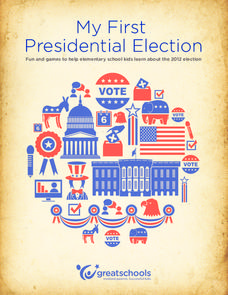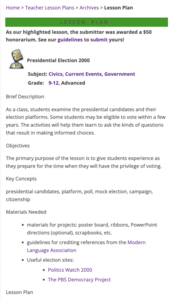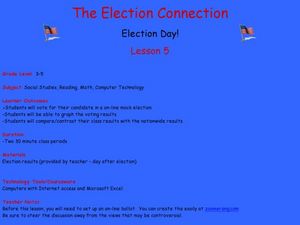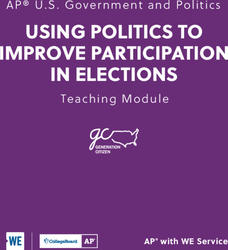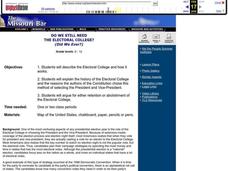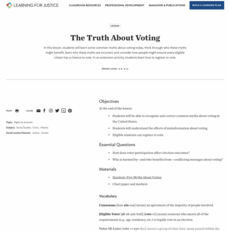iCivics
Mock Election
Here is an excellent resource in which class members host a mock election for a candidate and policy that will be implemented into your very own classroom. Progressing from primaries, through the campaign trail, and finally to the mock...
Curated OER
Mock Election
Here is an excellent PowerPoint presenting loads of information about the US election process. Some of the topics included in the slide show: the reasons voting is important, how to choose a candidate, how the federal, state, and local...
Great Schools
My First Presidential Election
Register, establish a platform, make campaign speeches, and design campaign advertisements with a study of presidential elections. Young citizens engage in various activities that mimic the election process.
iCivics
Mini-Lesson: Midterm Elections
Find out the differences between presidential and midterm elections with an informative resource. Pupils discuss the importance of midterms to the presidency and how midterms affect the balance of government branches. They also fill out...
DocsTeach
Election of 1800
The 2020 election is not the only unpredictable one in history. The Election of 1800 highlighted an unforeseen event in a presidential election. The activity reviews documents from the elections and what happened when the electoral...
Constitutional Rights Foundation
The Troubled Elections of 1796 and 1800
Congress does more than create new laws. Political scientists delve into the elections of 1796 and 1800 to understand how political parties, the Electoral College, and personal agendas affected the election process. The resource also...
Curated OER
Presidential Election 2000
Students examine the presidential candidates and their election platforms. They further analyze the platforms by creating a chart to determine which candidate most represents his or her beliefs and values.
Carolina K-12
Making First Vote Your Vote: Designing a Schoolwide Election
Encourage pupils to design an election plan for the entire school. They participate in a Board of Elections, create polling rules, discuss election controversies, write questions about the issues, run the election through an online...
Center for Civic Education
The Culminating Activity: Simulated General Election
What does a polling place look like, and what do poll workers do? Learners take what they have learned about voting procedures and role-play as poll workers in a simulated election activity.
iCivics
Students Power Elections
A Students Power Elections resource guide provides would-be voters with the guidance they need to become voters. Included in the packet is information about voter registration and voting, how to research candidates and ballot measures,...
Annenberg Foundation
Student Voices
Whether it's an election year or not, a unit on voting patterns and political campaigns will awaken the civic pride in your high school citizens. Divided into six parts, the curriculum covers various facets of an election, including...
Curated OER
The Election Connection
Students participate in a mock election. In this election lesson, students vote online in a mock election, graph the results, and compare their results to the nationwide results.
Curated OER
Getting Out the Vote: An Election Day Classroom Experiment
Students explore through a hands-on experiment why voting is important. They examine the potential impact of deciding not to vote. They they have the opportunity to vote in a mock presidential election if they choose to.
College Board
Using Politics to Improve Participation in Elections
Instructors new to teaching AP U.S. Government and Politics classes, as well as seasoned veterans, will find this teaching guide an invaluable resource. Using a project-based approach to civics education, the lessons emphasize real-world...
Encyclopedia Britannica
Becoming US President
It's that time of year, and the year. Once again the race is on for the White House. It's important that young voters, and would-be voters, understand the process for becoming the United States President. Class members research the...
Encyclopedia Britannica
Beyond a Two-Party System
Young political scientists go beyond the two-party system and research third-party candidates running in the 2020 US Presidential election. Groups present background information about the candidate, the party's platform points, and a...
Curated OER
INVITING CANDIDATES TO CLASS
Students explore the election process by researching politcal platforms, inviting candidates to speak, surveying registered voters, and running a mock election.
Curated OER
Do We Still Need the Electoral College?
One of the most confusing aspects of any presidential election year is the role of the Electoral College. Learners read a bit about how the Electoral College works and then they hold a mock election in their classroom. They'll redraw a...
Curated OER
4-H Citizenship Activity Page - Beginning Level
This is a 4-H citizenship activity that asks learners to examine county government, city councils, the three branches of the United States government, and complete a community service project. It also includes a word search, directions...
Constitutional Rights Foundation
Winner-Take-All: The Two-Party System
Two's company, three's a crowd. High school historians learn about the Electoral College, a two-party, winner-take-all voting system in the United States. The instructional activity explains the pros and cons of the two-party system,...
Teaching Tolerance
The Truth About Voting
True or False: Only Presidential elections matter. Academics delve into common voting myths to understand what is true and why the election process is critical to democracy. The lesson uses group discussion, activities, and handouts to...
Partnership for Public Service
Presidential Transition Guide
How do two administrations work together to craft a seamless transition of power? Learn more about personnel management, policy implementation, and the role of an outgoing president with a transition plan designed for the 2012...
Carolina K-12
Minnesota v. White: Exploring a Judicial Candidate’s First Amendment Rights
After watching a documentary on the Supreme Court case Republican Party of Minnesota v. White, class members research how the First Amendment and free speech issues influence judicial elections and then conduct a mock judicial election.
Constitutional Rights Foundation
270 Votes to Win: The Electoral College in the United States
What exactly is the Electoral College and how does it work? The instructional activity is part of a larger series on government that explains what the Electoral College is and how it helps determine an election winner. Academics...




